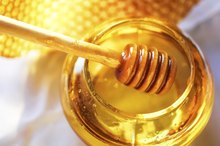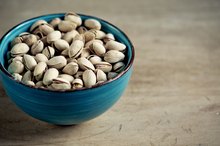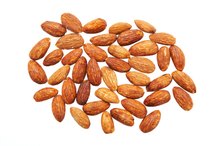Can Nuts Affect Blood Sugar?
If you worry about your blood sugar, carbohydrate-rich foods usually are the main culprit. Carbohydrates, once digested, become sugar, or glucose, and increase your blood sugar levels. Breads, pasta, breakfast cereals, rice, potatoes, cookies, muffins, sugar and soft drinks. Nuts generally have a low carbohydrate content, but could affect your blood sugar depending on how they are prepared or how many you have in a serving.
Raw or Roasted Nuts
A serving of 1 ounce of almonds contain 6.1 grams of carbohydrates, of which 3.5 grams are fiber, which means that only 2.6 grams of carbohydrates are available to raise your blood sugar levels. Fiber does not raise your blood sugar levels, but they are part of the total carbohydrate content. Subtracting fiber from the total carbohydrates gives you a better idea of the amount of carbohydrates that can truly affect your blood sugar. In this case, 1 ounce of almonds contains the equivalent of available carbohydrates found in 1/2 teaspoons of sugar, which is not likely to significantly affect your blood sugar levels. If you have a large serving, or about 1 cup of almonds, you will be getting 31 grams of total carbohydrates and 17.4 grams of fiber, which corresponds to 13.6 grams of available carbohydrates. This amount of carbohydrates correspond to the equivalent of almost a slice of bread and could raise your blood sugar levels to the same extent. Other raw and roasted nuts have similar nutritional value.
- A serving of 1 ounce of almonds contain 6.1 grams of carbohydrates, of which 3.5 grams are fiber, which means that only 2.6 grams of carbohydrates are available to raise your blood sugar levels.
- In this case, 1 ounce of almonds contains the equivalent of available carbohydrates found in 1/2 teaspoons of sugar, which is not likely to significantly affect your blood sugar levels.
Sugar-Coated Nuts
Can Salted Peanuts Make My Blood Sugar Rise?
Learn More
Some nuts are coated with sugar, honey or other high-carb coating, which can significantly influence how these nuts will affect your blood sugar levels. For example, 1 ounce of honey roasted almonds has 7.9 grams of carbohydrates and 3.9 grams of fiber, or 4 grams of available carbohydrates. In other words, honey roasted almonds have about double the amount of carbohydrates found in regular almonds, but it is still a fairly low amount of carbohydrates and may not significantly affect your blood sugar levels if consumed in small amounts. If you eat more than 1 ounce of these sugar-coated nuts, your blood sugar levels may raise considerably.
- Some nuts are coated with sugar, honey or other high-carb coating, which can significantly influence how these nuts will affect your blood sugar levels.
- In other words, honey roasted almonds have about double the amount of carbohydrates found in regular almonds, but it is still a fairly low amount of carbohydrates and may not significantly affect your blood sugar levels if consumed in small amounts.
Nut Butters
A serving of 2 tablespoons of natural nut butter contains the same amount of available carbohydrates found in 1 ounce of whole nuts. Like regular raw or roasted nuts, the way natural nut butter affect your blood sugar will depend on how much you consume at a time. Some nut butters, however, may contain added sugar and could definitely affect your blood sugar levels more compared to other nuts and nut butters. For example, 2 tablespoons of reduced-fat peanut butter contains 11.4 grams of carbohydrates and 1.7 grams of fiber, or 9.7 grams of available carbohydrates. These amount of carbohydrates is the equivalent of 2 teaspoons of sugar and could cause a slight increase in your blood sugar levels.
- A serving of 2 tablespoons of natural nut butter contains the same amount of available carbohydrates found in 1 ounce of whole nuts.
- These amount of carbohydrates is the equivalent of 2 teaspoons of sugar and could cause a slight increase in your blood sugar levels.
Cashews
Honey & Blood Sugar
Learn More
The nutritional value of most nuts is fairly similar with the exception of cashews, which have a considerably higher carbohydrate content. An ounce of cashews has 9.3 grams of carbohydrates and 0.9 grams of fiber, which corresponds to 8.4 grams of available carbohydrates or about half a slice of bread. A full cup of cashews provides 44.8 grams of carbohydrates and 4.1 grams of fiber, which corresponds to 40.7 grams of available carbohydrates or close to three slices of breads. Cashews can affect your blood sugar levels more compared to other nuts, but the raise in your blood sugar levels will depend on the amounts you have at a time.
- The nutritional value of most nuts is fairly similar with the exception of cashews, which have a considerably higher carbohydrate content.
- An ounce of cashews has 9.3 grams of carbohydrates and 0.9 grams of fiber, which corresponds to 8.4 grams of available carbohydrates or about half a slice of bread.
Related Articles
References
Writer Bio
Aglaee Jacob is a registered dietitian. She has experience working with people who have diabetes, cardiovascular disease, hypertension and obesity issues. Jacob obtained a bachelor of science and a master of science, both in nutrition, from Laval University in Quebec City, Canada.









